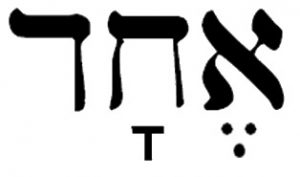by Lois Tverberg
Noticing that Jesus had given them a good answer, [one of the teachers] asked him, “Of all the commandments, which is the most important?” “The most important one,” answered Jesus, “is this: `Hear, O Israel, the Lord our God, the Lord is one. Love the Lord your God with all your heart and with all your soul and with all your mind and with all your strength.'” – Mark 12:28-30
 Jesus’ words that the most important commandment is to “love the Lord your God with all of your heart” are very familiar to us. Many readers also know that Jesus was quoting Deuteronomy 6:4-5 when he said this. By starting with the words “Hear O Israel…” he was beginning to say the Shema, a prayer of daily commitment to God that Jews have said since Jesus’ time up until today. One thing that that may strike us as odd is that the first line reads, “Hear, O Israel, the Lord our God, the Lord is one,” in many translations. Why is that so important to declare that God is one?
Jesus’ words that the most important commandment is to “love the Lord your God with all of your heart” are very familiar to us. Many readers also know that Jesus was quoting Deuteronomy 6:4-5 when he said this. By starting with the words “Hear O Israel…” he was beginning to say the Shema, a prayer of daily commitment to God that Jews have said since Jesus’ time up until today. One thing that that may strike us as odd is that the first line reads, “Hear, O Israel, the Lord our God, the Lord is one,” in many translations. Why is that so important to declare that God is one?
In Hebrew, the word is echad, which can mean one. It can also mean together, alone, only or unified. Jews have used the fact that it means “one” to see it as a reason that they cannot believe in a trinity or the deity of Christ. Christian evangelists say in response that echad can mean a compound unity, as when Adam and Eve together were echad (Gen. 2:24). This discussion of the word echad hinges on the idea that “the Lord is one” is a creedal statement about monotheism, and what kind of being God is.
Interestingly, the most authoritative Jewish text, the Tanakh by the Jewish Publication Society, says that the best reading of this phrase in this case really is not “one” but “alone.” So instead of reading this sentence as, “The Lord our God, the Lord is one,” it is more accurate to read it as “The Lord is our God, the Lord alone.” This changes the whole sentence so that instead of being a statement of monotheism, it is actually a command for a person’s absolute allegiance to God. God alone is the one we should worship, him only shall we serve. This also fits better into the rest of the passage, which tells us to love God whole-heartedly and to obey his commands.
Western Christians are very used to reciting statements of belief, so we might misunderstand this as saying that Jesus saw it as extremely critical that we believe in God’s “one-ness.” But when properly understood, it shows that the greatest commandment is not just the mental belief in monotheism, but is actually a call to entirely commit ourselves to the true God, him and him alone.
~~~~
See Listening to the Language of the Bible, by Lois Tverberg and Bruce Okkema, En-Gedi Resource Center, 2004. This is a collection of devotional essays that mediate on the meaning of biblical words and phrases in their original setting.
For a friendly, bite-sized Bible study of five flavorful Hebrew words, see 5 Hebrew Words that Every Christian Should Know, by Lois Tverberg, OurRabbiJesus.com, 2014 (ebook).



